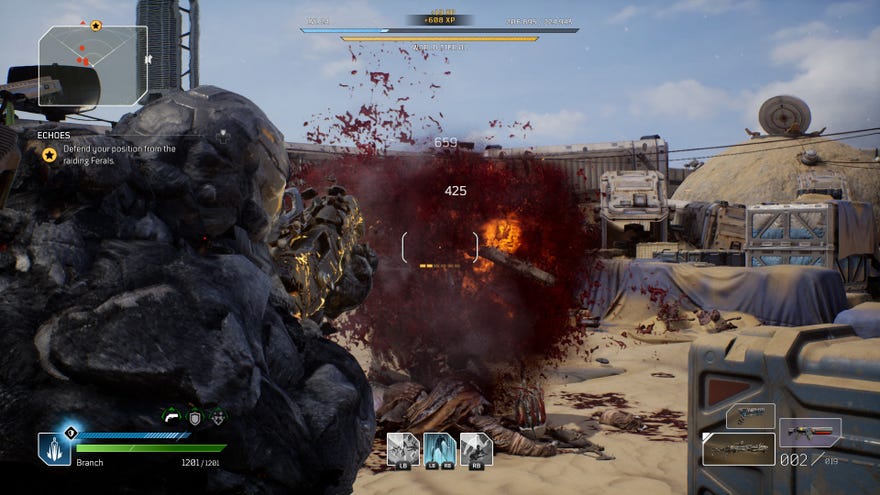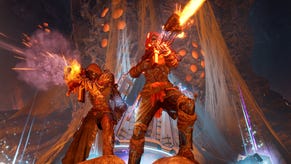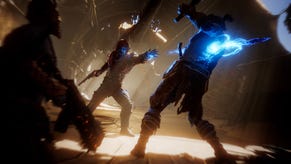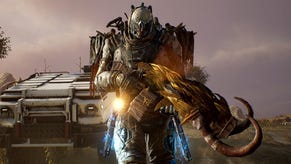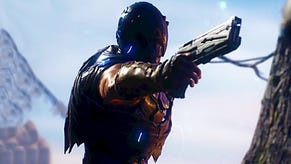Outriders review: A dopamine-dispensing closed loop for your monkey brain
Shiny space-trousers
Outriders is a looter shooter, a type of game in which space-trousers will sometimes come whizzing out of enemies after you kill them and lay there on the floor, glowing seductively, until you pick them up and appraise them. Occasionally these new space-trousers will be rarer than the pair of space-trousers you’re currently wearing, so you put them on and feel marginally happier about your day, until the unavoidable realisation that an even better pair of space-trousers must still exist - swooshier, with better stitching and inscrutable magic abilities - compels you to continue on your merry onslaught.
Your easily entranced monkey brain is the cornerstone of this dopamine-dispensing closed loop. Outriders is a science-fiction adventure in which you start out barely armed and dressed in damp brown rags, deploying what few abilities you have to salvage glittering rewards and incrementally improve your character’s murdering potential. The essential casino elements are all here: freshly dropped weapons and armour sparkle in different colours to indicate their rarity, training you to process the screen not with your caring human eyes, but those of a greedy magpie in search of shiny bottle caps.
As is the fashion, numbers ping out of injured enemies like fleas as you fire on them. At first: miserable little integers slither apologetically out of torsos, like if slugs could be numbers, as your feeble as low-level bullets connect. Before too long: your fully modded auto-shotgun is turning rogue army generals into expanding clouds of hot guts, through which some barely distinguishable and bright yellow four digit number can just about be seen, like a firework going off in an abattoir. The trick works. Bigger numbers and louder bangs make you feel happier, and in Outriders they increase in magnitude at just the right pace to keep the finely balanced concentration of chemicals inside your brain saying “okay, yes, this is nice, thank you”.
I’ve mostly been playing as the Trickster, a sort of sneaky techno-rogue class, like if David Blaine ever snapped and used his occult powers to carry out a series of high-profile, public assassinations. The Trickster can instantly teleport behind a distant enemy, stab everyone in front of you with a magic time-sword made of blue energy, or spawn a frazzling dome of light that temporarily slows down everything inside it. This last ability is the closest Outriders comes to feeling like the developer’s previous game, Bulletstorm, a brilliant, colourful and anarchic shooter that rewarded the player for killing enemies in inventive and acrobatic ways.
"I’ve mostly been playing as the Trickster, a sneaky techno-rogue class, like if David Blaine snapped and used his occult powers to carry out a series of public assassinations."
Inside your slow-dome, bullets are frozen in place like rice in a wedding photo. Enemies corpses twirl through the viscous air, peacefully, like they’re falling into a mattress in an advert about soft mattresses. You’re free to scoot around at full speed for these precious few fractions of a second, letting off the handful of shotgun rounds that will shred through baddies the instant the spell wears off and time returns to normal. There’s also a very fun time-sword that turns people into skeletons by deatomising their flesh. I’m not sure about the science behind that. Perhaps being hit with a time-sword rapidly ages you to your final age, which is “bones”.
Outriders feels entertainingly messy and technical when played up close. The series of battle arenas you’re running through are reliably littered with crates and trenches and sandbags and logs and crumbling bunkers to take cover behind, but you soon realise that despite the persistent on screen prompts inviting you to do so, you’re not actually supposed to hide. Duck behind a generic concrete column and you’ll be pelted with an endless barrage of rude grenades flushing you back out into the open.
Instead, classes in Outriders can typically only heal by attacking. The Trickster leeches health from any enemy they kill while in close range, so survival is a matter of teleporting right into the middle of the biggest bunch of enemies you can see, doing a few good murders in quick succession, and then either teleporting or running away again. Encounters are carefully choreographed to give you enough weakling grunts to farm for health while you or a teammate can focus on attacking the stronger, better defended and magic-wielding captains.
The skills you unlock as you level up introduce the crowd-control abilities needed for handling stronger enemy types on higher difficulty modes: a magic dagger that zips between enemies, for example, slowing them down and interrupting any moves they were charging up. In co-op play, these class abilities combine into more than the sum of their parts - though you can be pretty successful on all but the highest difficulty settings by spamming your abilities in an incomprehensible, fiery, timey, frazzled mess of limbs and special effects.
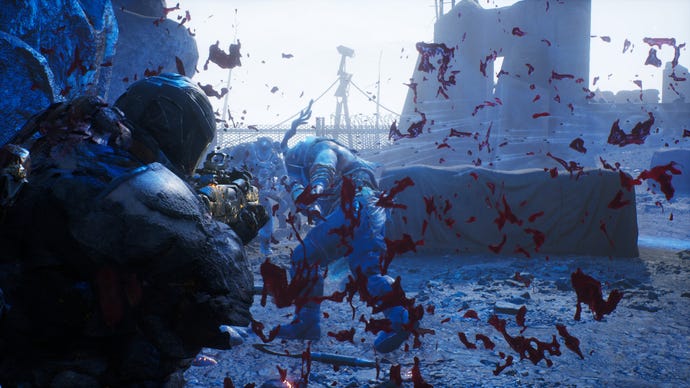
Even when playing solo, the world feels designed for more than one player. Every map in Outriders resembles a diagram of the human digestive system. You begin at one end, like a samosa, slithering down narrow throats littered with all that detritus you’re not supposed to take cover behind. This inevitably leads to a baggy stomach area to stretch your legs and fight a large number of small to medium sized enemies at once, which finally constricts again into a series of winding intestines that eventually squeeze you out through a cutscene sphincter, dumping you into a room large enough for a big boss fight. Usually there are optional bladders and fissures branching off the main route to investigate along the way, which serve as grounds for side quests and exploration.
It would feel formulaic if the environments these levels were wrapped in weren’t so lovingly crafted. Outriders has the unmistakable aesthetic of an Unreal Engine tech demo, but its snowy mountains and alien rainforests are each sculpted to treat the eyes, guiding you through the rain-slicked grey trenches of an outer worlds Verdun to expansive deserts and overgrown, bioluminescent jungles. Somebody’s made sure that no matter what direction you’re looking, your screen is always framing a pretty picture, some grand exoplanetary landscape or physics-defying geological oddness. Levels in Outriders are carefully controlled theme park rides from start to finish, beautiful to look at but never more than decorative backdrops to the same shooting action. Whether you’re pressing X to raise a gate, pressing X to unblock a cave or pressing X to vault over a small chasm, your arms are firmly inside the car at all times.
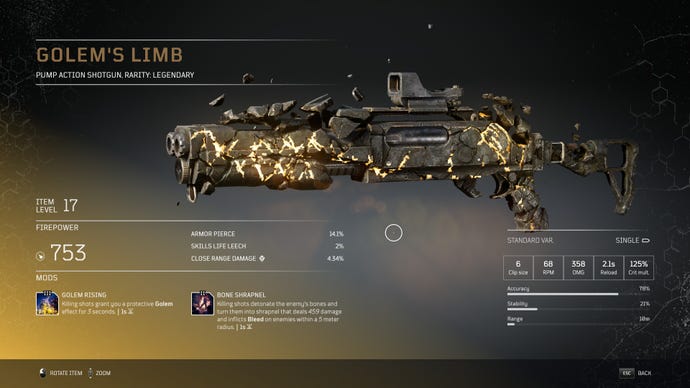
Of course, everything you’re doing is in service of shaking the invisible vending machine until more loot comes tumbling out, and it’s here that Outriders feels anaemic. For almost the entirety of the main campaign the weapons and armour you’re harvesting are barely distinguishable from one another, and bogged down with so many esoteric stats that it’s often not worth taking the time to make a meaningful decision about which stuff to equip. It took me about 15 hours before I came across a gun with a mod that did anything remotely interesting. Whenever I reloaded, anyone I’d hit would spontaneously burst into flames. Within minutes this weapon was being embarrassed by the random junk I was picking up off the floor, so to keep my favourite weird gun from becoming underleveled as I played, I needed to grind for the resources required to craft improvements to it.
Disassembling loot lets you keep the attached mods forever, even the big boy legendary ones, to apply them to otherwise mediocre weapons and armour in the game’s crafting system. The end game leans into this idea of building your own loot, the equivalent of opening a fresh pack of Panini stickers, eating the contents and burping up a rare new shiny that you didn’t technically earn. As a simple-minded person motivated by flashing lights, dice rolls and iridescent gloves that trace a playful arc through the air and land on the ground and rotate with a quiet but urgent humming sound, the ability to piece together an interesting gun using parts of other, better guns makes the very rarest loot feel less special.
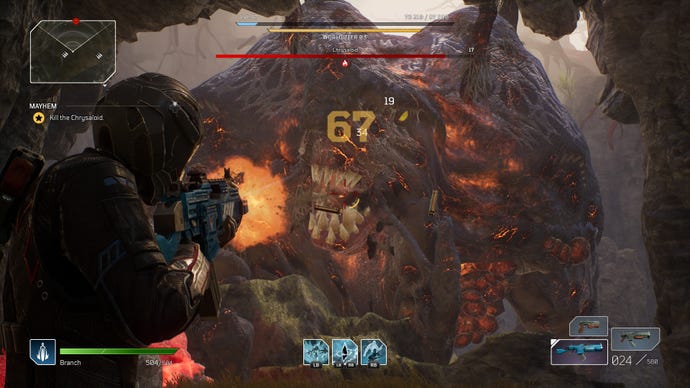
Outriders’ skill tree seems terrified of letting you get too strong, too. Each hard-won node — you only get a handful over the course of the campaign — grants you slim percentage bonuses to attributes so imperceptible or boring you’ll wonder if they’ve even been applied. Outriders can be played solo from start to finish, but this snide drip-feed of microscopic skill bonuses more clearly serves the co-op side of the game, where similarly levelled players need to be roughly as powerful as one another to keep things balanced. The thimble of serotonin that was supposed to ricochet around inside my skull whenever the game dramatically announced that I had a whole new class point to spend, was nowhere to be felt.
Expeditions are the post-campaign series of missions to grab the very best legendary loot and to fine-tune your character’s build, but the inconsistent rewards Outriders offers on the way to get there left me feeling unmotivated to dive back into its world. By the time you’ve unlocked the section of the game you’ve ostensibly been training for, you’ll have tired of the enemies and level layouts it can show you, and you’ll certainly have been driven to frustration by it’s weird always-online idiosyncrasies: the inability to pause when playing alone, the server issues that catapulted me back to the lobby the precise moment I finally defeated the boss I’d spent 45 minutes trying to kill, which necessitated a short walk outdoors and a nice long stare at a cloud before I felt normal again.
Outriders is a wildly entertaining time, especially when you get glimpses of the sarcastically gory fun of Bulletstorm peeking through. But the loot mechanics aren’t bewitching enough, or its action varied enough, or levels surprising enough, to sustain the momentum needed to send me back out in search of better space-trousers, no matter how legendary they may be.
